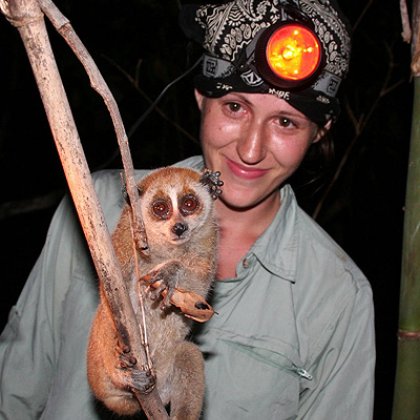
Malaria, landmines, elephants and a diet of frogs has not kept The University of Queensland PhD student Carly Starr from becoming a world expert on a Cambodian animal not unlike a possum.
Ms Starr has become the first western researcher to study the wild pygmy loris, a small nocturnal primate found only in parts of Cambodia, Laos, Vietnam and China.
The 27-year-old has just returned from field studies in Cambodia, where she first began her search for the pygmy loris in mid 2006.
She hopes to complete her thesis on the animals in January as part of her studies at UQ’s School of Animal Studies.
Former Khmer Rouge soldiers and indigenous people joined Ms Starr in her search, keeping an eye out for elephants and landmines in the dense forests where the nocturnal animals with the big eyes live.
Covering the ground was often done on domesticated elephants and sleeping tended to be in hammocks strung up in trees.
The party kept close to river systems for water and fish, while rain brought out frogs to supplement a diet otherwise consisting of rice and tinned foods.
Ms Starr said her early days in Cambodia were among the hardest because she did not speak the language.
“At first it was very hard and it was very isolating,” she said.
“But that didn’t last long. People were very warm and inclusive. They would string their hammocks next to you and keep you company when we weren’t out following the animals in the forest.”
Ms Starr said life in the forest initially seemed daunting, but she quickly adjusted.
“When you are there, it seems normal. You go through the motions. It’s when you come back here that it seems more adventurous.”
But the most difficult thing for Ms Starr was contracting malaria, forcing her to be evacuated to a hospital in Thailand.
During recuperation in Brisbane, Ms Starr realized she had come too far to give up her studies.
Ms Starr said she had become very fond of the pygmy loris, saying it was ”cute and cuddly”, even though it could secrete a toxin known to cause anaphylactic shock from its upper arms, rub it on its teeth and bite potential threats.
“When you shine a light on them they freeze so it is easy to catch them. They might try to bite when you first catch them, but when you scratch them behind the ears they appear to enjoy it.”
Ms Starr began studying the pygmy loris, after hearing how little known the animals were while doing a rodent survey in Cambodia.
Pygmy lorises are threatened because of the demand for their use in traditional medicines.
Ms Starr’s studies showed numbers were rapidly declining in Cambodia.
She hopes to work for international organizations dedicated to conservation.
Media: Carly Starr (0466 090 956) or Erik de Wit (3346 7086, 0417 496 397)
.jpg)



